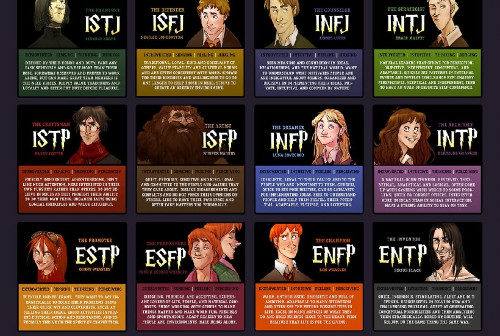Does your personality affect your parenting?
Well, obviously it does. Few things in life so profoundly express your world-view and values as the way you raise your children. But are your parenting choices shaped by characteristics of which you are not consciously aware?
A recently published study argues that they are. The study, published by Truity, uses the Myers-Briggs test, which assesses people based on four opposing pairs of personality traits: introversion/ extroversion, intuition/ perception, thinking/ feeling, and perception/ judging. Based on your preferred behaviour, you are categorized as one of sixteen personality types, represented by a four letter code. (The image above illustrates this using characters from Harry Potter. Other pop culture examples are available.) The Myers-Briggs test is popular in the business world, although its scientific validity is hotly disputed. This study claims to be the first serious application of the theory to family life.
I know my Myers-Briggs type in much the same way I know my star sign, and my Chinese birth year, without giving too much credence to any of them. I am an INTP: introverted, intuitive, analytical and inclined to abstraction. (Hermione Granger, apparently. Or Yoda.) You can see immediately how we might be more or less inclined to believe this description depending on how flattering we find it. I identify strongly and proudly as an introvert, despite society’s preference for extroversion. Being “intuitive” sounds nice, but does that mean I’m unobservant? And “analytical” makes me sound cold, robotic. Human beings are suspicious of too much rationality.
According to the study, I’m supposed to be a reluctant parent. This does not chime with me at all. I love the company of children, their humor, spontaneity and lack of cynicism, and much of my professional life has been spent working with families. However, INTPs who have kids are more likely to be stay-at-home parents. In my case, this has come about largely because I work from home, and as a freelancer I can organize my time around the children. But it’s a situation I’m very happy with, and would be reluctant to change.
It’s noticeable that the study focuses more on lifestyle choices than those difficult parenting decisions: are you strict or indulgent? Organized or spontaneous? Friend or authority figure? I found one statement by an INTP parent resonated more strongly with me than any statistical analysis:
“I think being an INTP parent there is a willingness to let the children be themselves, as far as their personalities; a letting go of trying to make them what I want them to be; a respect for them as individuals to make their own life choices.”
If there is one thing I feel certain of based on twenty years of parenting and working with parents, it’s that we don’t shape our children as much we like to imagine. We must keep them safe, healthy and stimulated, so they grow strong, and teach them values so that they can find their place in society. But if we try to mould them, we will only stunt and damage them. The best we can do for them is to help them become who they truly are.
Or maybe I just think that because I’m a Scorpio.
Image: makani.deviantart.com




